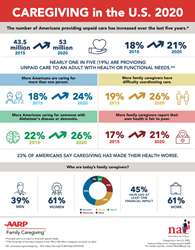
Infographic
Caregivers are essential to the nation’s public health, and the magnitude of millions of Americans providing unpaid care means that supporting caregivers can no longer be ignored.
WASHINGTON (PRWEB)
May 14, 2020
A new study from the National Alliance for Caregiving (NAC) and AARP finds that the number of family caregivers in the United States increased by 9.5 million from 2015 to 2020 and now encompasses more than one in five Americans. Caregiving in the U.S. 2020 also reveals that family caregivers are in worse health compared to five years ago. As the demand for caregiving rises with an aging population, more must be done to support this vital work. This report highlights the nearly 48 million caregivers caring for someone over the age of 18, and is available here.
“As we face a global pandemic, we’re relying on friends and family to care for the older adults and people living with disabilities in our lives,” said C. Grace Whiting, JD, President and CEO of NAC. “Caregivers are essential to the nation’s public health, and the magnitude of millions of Americans providing unpaid care means that supporting caregivers can no longer be ignored. This research reveals that growing need. Family caregivers care for more people than in 2015 and they take on more care responsibilities as roughly one in four care for two or more people. Many individuals are caring for a longer time, with nearly a third (29%) of caregivers nationwide reporting they have been caregiving for five years or more—up from 24% in the last study.”
This new study shows that the profile of the family caregiver is changing. While caregiving spans all generations, Caregiving in the U.S. 2020 found more young people providing care, including 6% who are Gen Z and 23% who are Millennials. Nearly half (45%) are caring for someone with two or more conditions—a significant jump from 37% in 2015.
Caregiving in the U.S. 2020 also found that:
-
Caregivers face health challenges of their own: nearly a quarter (23%) of caregivers find it hard to take care of their own health and 23% say caregiving has made their health worse. - Personal finances are a concern for family caregivers: 28% have stopped saving, 23% have taken on more debt and 22% have used up personal short-term savings.
- On average, caregivers spend 23.7 hours a week providing care, with one in three (32%) providing care for 21 hours or more, and one in five (21%) providing care for 41+ hours—the equivalent of a full time unpaid job.
“The coronavirus pandemic is exacerbating the challenges family caregivers were already facing from a personal health, financial and emotional standpoint,” said Susan Reinhard, RN, PhD, Senior Vice President at AARP. “Family caregivers provide vital help and care for their loved ones, yet this survey shows that they keep getting stretched thinner and thinner. We must identify and implement more solutions to support family caregivers—both in the short term as we grapple with coronavirus and in the long term as our population ages and the number of family caregivers declines.”
Caregiving in the U.S. 2020 was conducted by Greenwald & Associates using a nationally representative, probability-based online panel. More than 1,700 caregivers who were age 18 or older participated in the survey in 2019. First conducted in 1997, with follow up surveys in 2004, 2009 and 2015, the Caregiving in the U.S. studies are one of the most comprehensive resources describing the American caregiver. The 2020 study was funded by AARP, Best Buy Health Inc. d/b/a GreatCall, EMD Serono Inc., Home Instead Senior Care®, The Gordon and Betty Moore Foundation, The John A. Hartford Foundation, TechWerks, Transamerica Institute, and UnitedHealthcare.
###
About AARP
AARP is the nation’s largest nonprofit, nonpartisan organization dedicated to empowering people 50 and older to choose how they live as they age. With a nationwide presence and nearly 38 million members, AARP strengthens communities and advocates for what matters most to families: health security, financial stability and personal fulfillment. AARP also produces the nation’s largest circulation publications: AARP The Magazine and AARP Bulletin. To learn more, visit http://www.aarp.org or follow @AARP and @AARPadvocates on social media.
About the National Alliance for Caregiving
Established in 1996, the National Alliance for Caregiving is a non-profit coalition of national organizations focusing on advancing family caregiving through research, innovation, and advocacy. NAC conducts research, does policy analysis, develops national best-practice programs, and works to increase public awareness of family caregiving issues. Recognizing that family caregivers provide significant societal and financial contributions toward maintaining the well-being of those in their care, NAC supports a network of more than 80 state and local caregiving coalitions and serves as Secretariat for the International Alliance of Carer Organizations (IACO). Learn more at http://www.caregiving.org.
Share article on social media or email:

